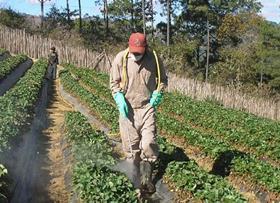
According to research from the European Commission’s Joint Research Centre and two Dutch laboratories, 45 per cent of Europe’s topsoil was found to contain residues of controversial herbicide chemical glyphosate.
The finding demonstrates the over-reliance of the EU agricultural model on the chemical, according to a report from Sustainable Pulse.
The study analysed 317 EU soil samples of arable land, revealing that 42 per cent contained AMPA, the most toxic metabolite of glyphosate, while glyphosate was found in 21 per cent of the soils. Meanwhile, 18 per cent of the samples contained both.
The study was conducted on six crop systems in 11 EU member states, examining soils subject to different geographical and climatic conditions.
The research was carried out by the Dutch University of Wageningen and Rikilt laboratories in concert with the JRC.
Angeliki Lyssimachou, Pesticide Action Network (PAN) Europe’s ecotoxicologist, commented: “This study clearly contradicts the predictions of European authorities that glyphosate does not persist in the environment.”
According to the study, Denmark, the UK and Portugal recorded the highest detection frequency, while Italy and Greece appeared to use less glyphosate on their crops.
However, the two molecules were found in every tested member state, with all crops examined showing residues of glyphosate and AMPA.
According to Sustainable Pulse, the results reveal that the accumulation and persistence of glyphosate in the soil have been underestimated by the European authorities.
Henriette Christensen, PAN Europe’s agriculture policy officer, commented: “Over the last years, a growing body of evidence shows that soil health is one of the main drivers of growing healthy crops that will resist pest attacks. Glyphosate destroys soil health and leads to more pesticide uses. Our farmers must leave this vicious circle.”
The concentrations of glyphosate and AMPA found in the study have been shown to be toxic to soil organisms such as earthworms, beneficial bacteria and fungi.
“Policy makers must stop the use of these harmful chemicals in the production of our food,” added Lyssimachou. “It is more than time to implement all existing non-chemical alternatives to herbicides.”



